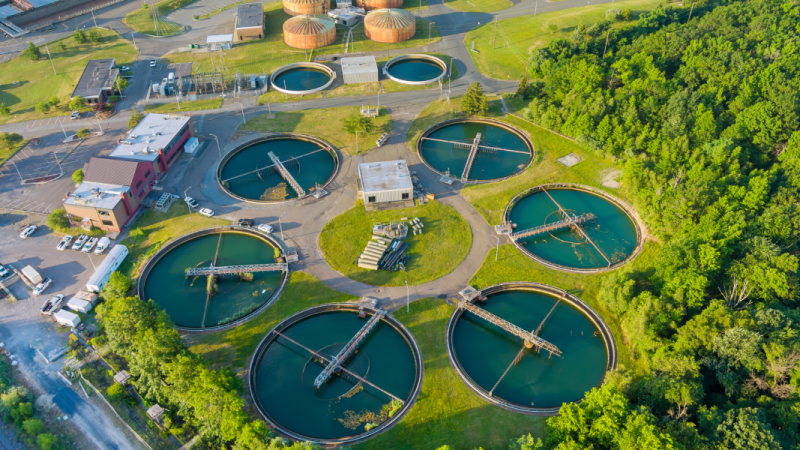Sustainable Solutions for Houston's Wastewater Infrastructure

Categories :
Space City is growing at warp speed and needs wastewater treatment to match
Houston's unprecedented population growth poses a challenge for its wastewater infrastructure. Exploring sustainable solutions is crucial to meet the rising demands while preserving environmental integrity. From innovative technologies to strategic planning, discover the pathways to a resilient and eco-friendly future for wastewater treatment systems in Houston.
Between 2010 and 2030, Houston is expected to welcome approximately 2.2 million new residents for a projected 37.68% increase. Along with the rest of sprawling Harris County, the state's most populous, Houston pushes the county to the third spot in the nation for population growth, with an expansion rate since 1990 that is double the national average. Harris County, with Houston as its seat, is predicted to grow from its current 4.7 million to 6.3 million by 2040, creating dramatic wastewater treatment challenges.
Strategic Planning Is Needed
According to the Houston-Galveston Area Council, regionalization of wastewater infrastructure for Harris and nearby counties has been exhaustively studied and pushed since the 1970s. Regionalization would consolidate wastewater systems, connecting their pipe and conveyance networks to large, centralized regional plants. That push toward regionalization, however, has faced a snarl of concerns, among them:
- Complexity of negotiations across multiple jurisdictions.
- Lack of regional funding mechanisms.
- Costs of conveyance to the nearest plant.
- Disturbance to historically and culturally significant sites.
- Impact on environmentally sensitive ecosystems.
- Cost of retrofitting and redevelopment.
These and other issues have made it easier for individual entities to fund projects that do not require complex coordination. Frequently, that incentivizes localized, small-scale plants. Once small plants are commissioned, the owners tend to be reluctant to cede control when they are happy with their systems the way they are.
Utilities could step in with smaller-scale solutions for Houston's flooding problems. In many areas, homeowner septic systems are the predominant mode of treatment, and water wells are the main source of water. Where septic systems are susceptible to flooding and the density of septic systems is high, overflows can contaminate groundwater wells. In the Airline Improvement District, nine miles north of downtown Houston, groundwater contamination from septic overflows recently prompted the county to upgrade drinking water and wastewater systems. In many cases, it makes more sense to use small-scale solutions than to find a way to connect to distant water grids.
This move toward solutions that are scaled down to fit smaller service areas is called decentralization. Within the water sector, experts have long urged more decentralization. Rapid growth in and around Houston has brought decentralization from theory to practice in a much more effective way than in most regions.
New Tools for Wastewater Treatment
Developers and builders of master-planned communities around Houston have been taking advantage of the relatively new availability of modular wastewater treatment units. Modular units can be trucked in and installed as part of prepackaged plants, cutting construction time and improving scalability. Many builders are breaking ground in areas that have no utilities in place as the Houston area expands, and modular treatment makes the push possible.
Companies have also begun to offer more flexible financing modes, and the Public-Private Partnership (P3) ACT is working its way through the state legislature to encourage infrastructure development. P3 arrangements typically bundle long-term operations and maintenance for the wastewater infrastructure they deliver, which can remove a significant burden from utilities or other entities tasked with providing wastewater treatment.
Technology Produces Higher-Quality Effluent
While conventional activated sludge wastewater treatment is still the most common method in Texas, the membrane bioreactor (MBR) is the new kid on the block. MBR offers a higher capacity on a smaller footprint that fits the modular units, so it aids decentralization. Combining biological and membrane treatment, MBR offers a much higher quality effluent ideal for release into the environment or for nonpotable reuse applications, and Texas has reuse incentives in place to offset higher MBR operating costs.
Compliance with Texas Commission on Environmental Quality regulations can present challenges, but one leading Houston-based water infrastructure company reports that MBR projects glide through the approval process in a quarter of the time of traditional ones. Shorter project timelines may account for MBR's popularity in the expanding Houston market.
While ambitious centralized plans have been hindered by their complexity, politics, and costs, more agile strategies and technologies are quickly providing wastewater infrastructure. Houston needs wastewater infrastructure to match the speed of its growth while protecting precious water resources and the environment.
Citiesabc was created by a team of global industry leaders, academics and experts to create new solutions, resources, rankings and connections for the world’s top cities and populations.









